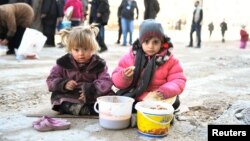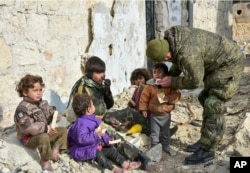A senior U.N. humanitarian official working in the Syrian city of Aleppo said Wednesday that combat damage in the former rebel-held eastern districts was enormous but that there was a sense of optimism because the guns had fallen silent — at least for now.
Sajjad Malik, humanitarian coordinator in the city that was once Syria's business hub, told U.N. correspondents by audio link that people in Aleppo had put their hopes in the peace process that brought the cease-fire, under which rebels gave up the city's eastern areas last month after weeks of battering by troops loyal to President Bashar al-Assad.
So many previous cease-fires have failed, he said, "but this time somehow they feel that maybe the international community will stick around and maybe they will be able to reclaim their lives and livelihoods."
Malik said the U.N. got into eastern Aleppo on New Year's Day, and since then 106 staff members have been going in and out, trying to meet the needs of people who survived almost six years of conflict.
"Nothing prepared us for what we saw inside there," Malik said. "The destruction is at a level that is hard to imagine."
He was encouraged, however, to see children coming out to play and people starting to talk about reclaiming their lives.
"The immediate and urgent needs are enormous," Malik said, including cleaning up huge amounts of rubble, addressing concerns about families that have been separated, and getting youngsters traumatized by war back to school for the first time in more than five years.
"What we're doing is just the beginning," he stressed, adding that the U.N. has asked for reinforcements to cope with the urgent needs.
"Aleppo's reconstruction is going to take a much longer time and way more resources than we have right now," Malik said. "Even in the medium term we're going to need more resources."
He said the U.N. can now operate in all but one district of eastern Aleppo, where explosives are being cleared. Some 20,000 people are receiving hot meals twice a day and 40,000 are getting fresh-baked bread, and there are also seven mobile clinics and 12 mobile teams visiting east Aleppo every day, he said.
Some went west, some to Idlib
Malik said of the 116,000 recently displaced people from east Aleppo, roughly 80,000 went to the government-controlled western part of the city and 36,000 went to rebel-held Idlib, some under the cease-fire deal brokered by Russia and Turkey.
Malik said that he couldn't estimate the population in east Aleppo but that there were about 1.5 million people in the city as a whole, including 400,000 internally displaced people who came to western Aleppo and have been supported by the U.N. and its partners in recent years.
Some 4 million people lived in the city before Syria's civil war erupted in 2011, with various rebel groups fighting to oust Assad and his government.





